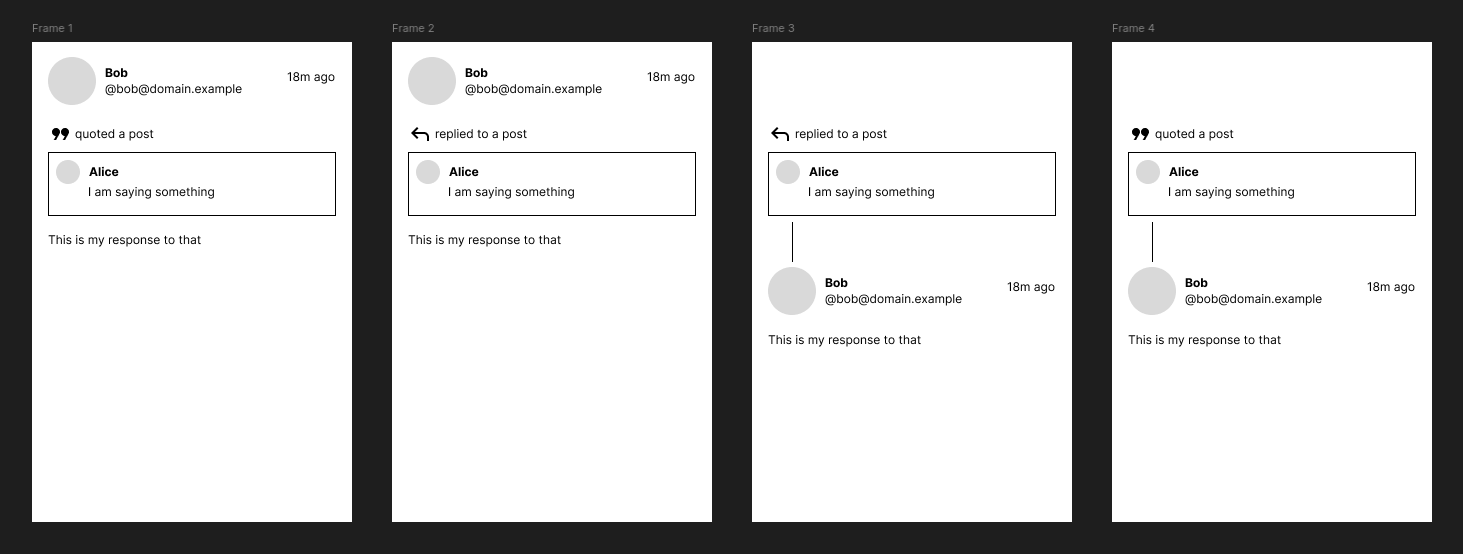to some extent the naming scheme of the term doesn’t matter as much as the IRI it expands to (https://misskey-hub.net/ns#_misskey_quote) or as much as the fact that the same term is broadly used. i understand it isn’t camelCase but it is at least properly namespaced.
_misskey_quote is supported by at least Misskey, all Misskey forks, and Threads. as:quoteUrl seems to have been picked by Pleroma and its forks. i can’t say with 100% certainty but i am pretty sure _misskey_quote is more widely supported on both the producing and consuming side.
aside on semantics
i’m not entirely sure what the exact semantics of a “misskey quote” are but it seems to match what mastodon wants out of “quote posts”, which seems to align vaguely with how twitter conceptualized “quote tweets”, although over there they look something like this in the v2 API:
"referenced_tweets": [
{
"type": "quoted",
"id": "1327011423252144128"
}
],
and their v1.1 API looks like this:
{
// ...
"text": "To make room for more expression, we will now count all emojis as equal—including those with gender and skin t… https://t.co/MkGjXf9aXm",
"truncated": true,
"entities": {
// ...
"urls": [
{
"url": "https://t.co/MkGjXf9aXm",
"expanded_url": "https://twitter.com/i/web/status/1050118621198921728",
"display_url": "twitter.com/i/web/status/1…",
"indices": [
117,
140
]
}
]
},
// ...
"is_quote_status": false,
}
so it looks like the evolution started with “this is a link that is being quoted” and moved onto “this is the quoted status”.
back in Disambiguating various interpretations of a "quote" feature [pre-FEP] i explored the different aspects of what a “quote” could be – i continue to think that a great deal of “quote posts” most often fall into a bucket of “i am responding to the contents of the quoted post” (in which case, inReplyTo would be more appropriate and you could just render the replied-to post as a rich preview above):
above, we can see that “reply” and “quote” can be handled in exactly the same way – every reply can be handled like a quote, and it wouldn’t even be wrong. on the level of semantics, something is either a response or not. the prepend UI can be shown always. i’m still not sure what exactly a quote relation is supposed to mean, especially in the case where your post is not a response, and especially in a vacuum where twitter quote tweets never existed. over the past however-many years, people have tried using tag, attachment, and more bespoke properties to try to describe this relation. when i asked about this in infinite love ⴳ: "question mainly to proponents of quote posts, but…" - Mastodon the responses i got were all over the place, but the best i could say at the end was that “quoting” is roughly equivalent to “citing in full”. in the most generic sense, someone recommended from the CITO ontology http://purl.org/spar/cito/cites CiTO, the Citation Typing Ontology which has a lot of subproperties that are probably too granular for what most people care about – replies to, agrees with, even ridicules for those instances of quote dunks!
ultimately, the activity flow for requesting and obtaining authorization for a “quote” is independent of what a “quote” actually is. but insofar as anyone cares about “compatibility with existing representations”, _misskey_quote is the least compromised option here.
